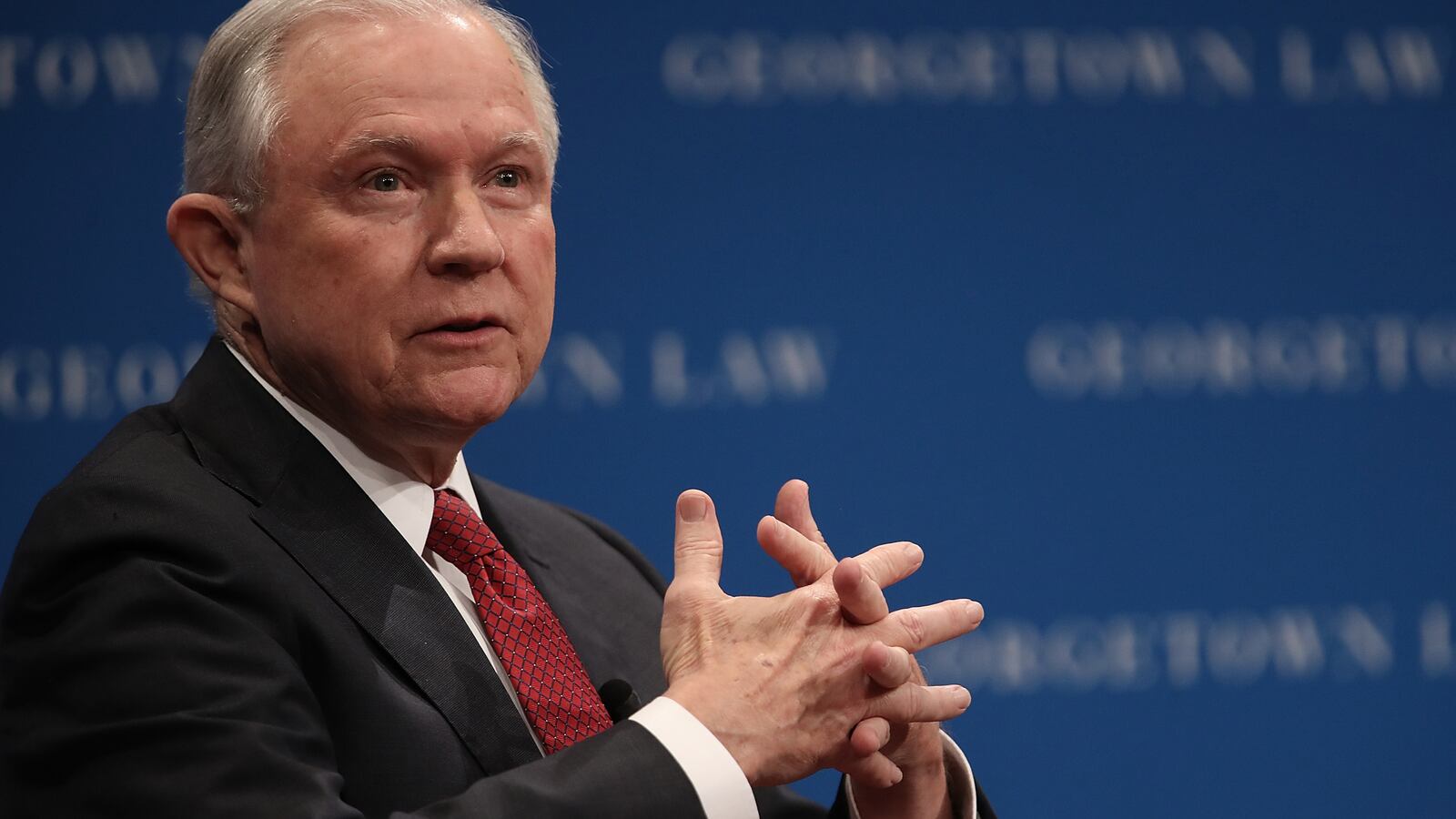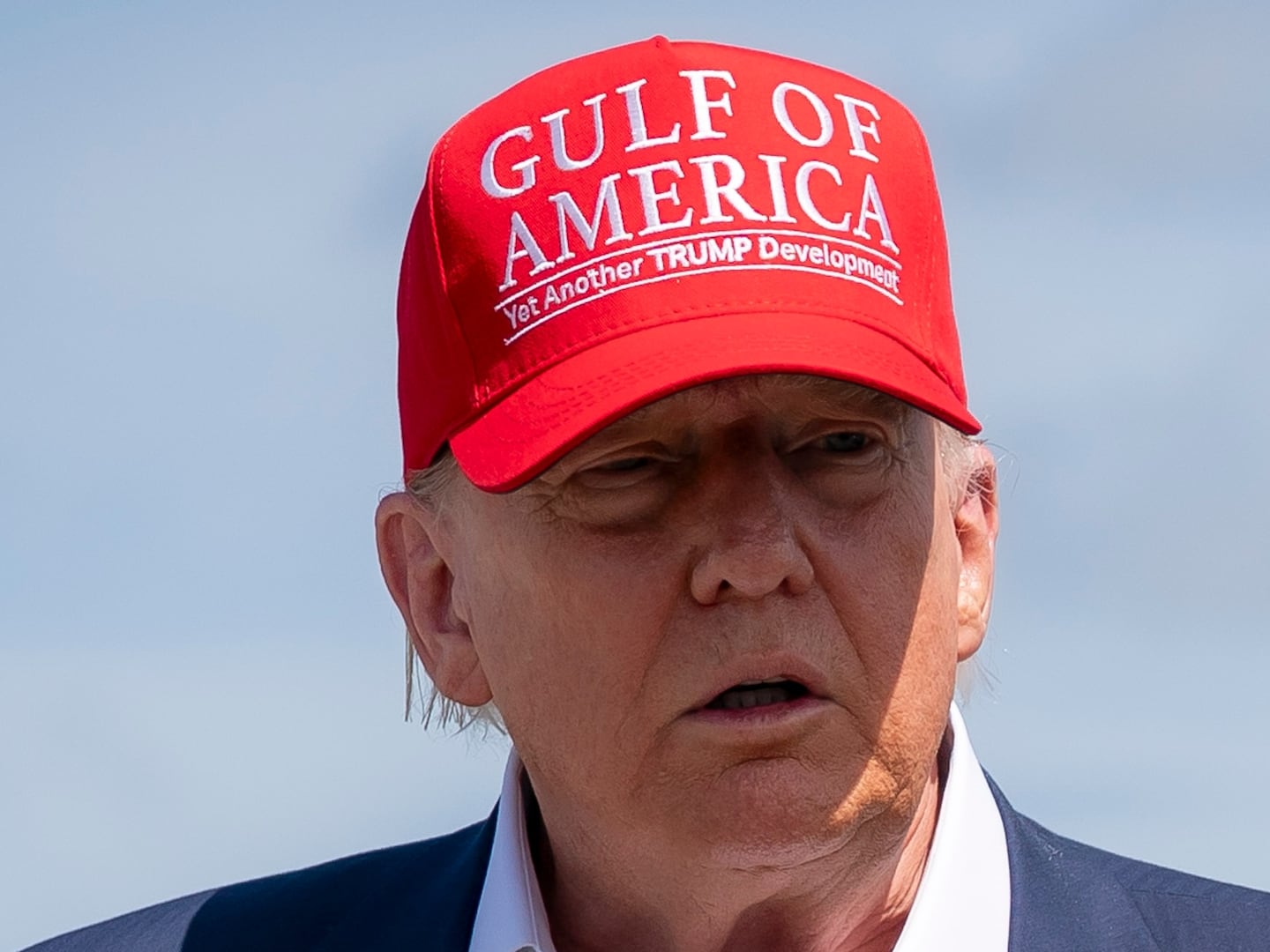While Attorney General Jeff Sessions announced that his Justice Department is joining the campus free speech wars, while protesters were barred from going inside the building where he spoke.It’s the kind of practice he criticized in his speech. And it was one of the smaller ironies surrounding his speech on Tuesday afternoon at Georgetown Law School, where he made a vociferous defense of free speech just hours after President Donald Trump tweeted that NFL players shouldn’t be allowed to express their views by taking a knee during the National Anthem.
“In this great land, the government does not tell you what to think or what to say,” Sessions said in his speech––just three hours after Trump told that the NFL it should bar players’ protests.
Campus protests have become a focal point of the culture wars unfurling during the Trump administration. Conservative and right-wing speakers, including Ben Shapiro and Milo Yiannopoulos, have generated enormous protests by speaking on some college campuses. And the Trump administration has been clear it will protect controversial speakers’ First Amendment rights.
But the administration has also taken steps that are widely viewed as chilling of free speech––including Sessions’ Justice Department, which is currently revisiting the previous administration’s policy protecting journalists from being subpoenaed. Next week, top Justice Department officials are scheduled to meet with media advocacy and free speech groups to discuss the issue.
So the timing of Sessions’ speech was, well, complicated. And it highlights just how thorny First Amendment issues are becoming for this administration.
Sessions also defended the president’s NFL criticism in a Q&A session after his speech.
“The president has free speech rights too,” he told Georgetown Law Prof. Randy Barnett, who hosted the event.
“I agree that it’s a big mistake to protest in that fashion because it weakens the commitment we have to this nation that has provided us this freedom,” Sessions added, of NFL taking a knee during the National Anthem. “I would note, of course, that the players aren’t subject to any prosecution, but if they take a provocative act they can expect to be condemned and the president has the right to condemn them.”

Georgetown University Law School students cover their mouths with tape as U.S. Attorney General Jeff Sessions speaks at the Georgetown University Law Center September 26, 2017. Sessions spoke on the topic of free speech on college campuses and took several questions following his remarks.
Win McNamee/GettyIf Sessions had hoped Georgetown Law students would prove his point about efforts to quell free speech, he would have been disappointed. A handful of students in the auditorium for his speech put strips of tape over their mouths after he spoke. But besides one person yelling the Alabama football slogan “Roll Tide!” after his speech concluded, there were no outbursts.
And while his appearance on campus drew criticism from some faculty, a letter they signed criticizing his speech specifically acknowledged his right to be there.
“We acknowledge our colleague’s right to invite Attorney General Sessions to speak on campus,” said that letter, signed by more than 30 law school professors.
“However, we, the undersigned, condemn the hypocrisy of Attorney General Sessions speaking about free speech,” it continued.
In his speech, Sessions criticized the fact that some campuses have so-called “free speech zones” for people who want to make controversial statements. These zones are sometimes very small and only open for specific hours. Their critics, including Sessions, argue they can curtail the First Amendment rights of students which should be protected on public university campuses.
According to an email obtained by The Daily Beast that went to the law school’s student body, protesters of the attorney general were also confined to three specific free speech areas.
And in the speech, he announced that the Justice Department would support students at Georgia Gwinnett College suing to knock down its free speech zones.
Sessions’ speech was only open to a narrow group of students: those in classes with Sessions’ host Prof. Randy Barnett, and those who had previously signed up to be invited to events held by the law school’s Center for the Constitution.
Barnett told reporters he made the decision to invite attendees this way so the event would be civil. He added that this kind of arrangement isn’t unusual, and that the law school frequently has invite-only events.
Some students still thought it was hypocritical of Sessions to speak on free speech to an invite-only crowd.
“I find the audacity of it pretty galling,” Bryan Jennings, a student in his second year at Georgetown Law, told The Daily Beast. “He’s going to use Georgetown Law as a prop to engage in the conservative culture war about free speech on campus, he’s going to demonize Georgetown Law students, and he’s going to do it in front of a curated friendly audience. It’s almost unbelievable hypocrisy.”
There were more than 100 open seats for Sessions’ speech.






